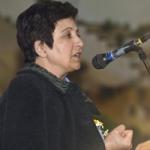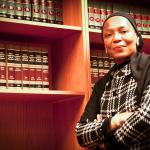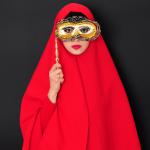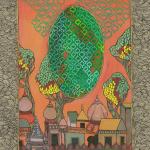Shirin Ebadi, an Iranian lawyer and a former judge, won the Nobel Peace Prize in 2003 for her pioneering efforts to promote democracy and human rights, especially for women and children. She is the first Muslim woman to receive the award, and the first person from Iran to do so. In this interview for Muslima, conducted by Samina Ali and Ashraf Zahedia, Shirin Ebadi talks about her dreams for the future of Iran and what gives her courage.
IMOW: In 1970, after studying law at Tehran University, you began a career as a judge. Within five years, you had become a president of the Tehran city court, the first woman in Iranian history to be appointed to the position. How did that accomplishment feel?
Dr. Shirin Ebadi: I was proud, and at the same time I felt a big responsibility was placed on my shoulders. If I did not succeed as a judge, it would have reflected on all Iranian lawyers, particularly women. And if I succeeded, it would have led to their victory. It was indeed a big responsibility.
Unfortunately, the Islamic Revolution in 1979 resulted in that position being taken away from you. Since then, you’ve said, “An interpretation of Islam that is in harmony with equality and democracy is an authentic expression of faith.” Some readers might think, “Islam and democracy are contradictory terms. Islam and equality are also contradictory.” Please elaborate on your ideas for our readers.
In undemocratic countries such as Iran and Saudi Arabia, the authorities justify their human rights violations by resorting to Islam and by framing their actions as religiously sanctioned. Thus, no one has the right to object to their actions and if one dares to do so, he/she would be accused of violating the religion and face severe punishment.
We are familiar with the workings of undemocratic regimes and how they abuse religion. It is up to us to show that other religions have gone through transformation by adjusting to social change. For example, the church in the West has gone through much adjustment in regards to abortion. Some churches approve of it, while others oppose it.
It is the same in Islam—Islam is practiced differently in different countries. Women in Saudi Arabia are not allowed to drive. The largest Muslim population lives in Indonesia, and long ago this country was governed by a woman. There are examples of women leaders in Pakistan and Bangladesh as well.
The question is then, what does Islam say about women’s rights? In some Islamic countries, polygamy is allowed, whereas in Indonesia and Tunisia it is abolished. Islam has different interpretations, like any other religion. We must promote an interpretation of Islam that is in harmony with human rights and democracy. The undemocratic regimes take advantage of religion to promote their own undemocratic ideologies.
I need to emphasize that I believe in secularism. The state needs to be separate from religion so that the political authorities would not take advantage of people’s religious beliefs in promoting their own agenda. In 1979 Iranian people voted for an Islamic regime but that does not mean that the regime, in guise of religion, can violate people’s rights. Islam recognizes equal rights, and in many cases Iranian feminists, including myself, have drawn on Islam to promote human rights and democracy in Iran. But we still have a long way to go.
There is a famous quote from you from 1999 in which you are quoted as saying, “Any person who pursues human rights in Iran must live with fear from birth to death…” Can you please explain the situation in Iran that can make such a statement true?
The Iranian regime is in violation of human rights in Iran, and is not willing to listen to people’s voices. There is a quest for human rights in Iran and currently there are many human right activists in the Iranian jails.
A case you worked on was that of Arian Golshani. She was a nine-year-old girl who was tragically beaten to death by her father and stepmother. Her mother was denied custody because Iranian laws favor fathers over mothers. Were you able to change child custody laws?
I defended Arian Golshani’s case and was her mother’s attorney. But the real offender in this case was the Iranian law that did not allow Arian’s mother to get the custody of her daughter. The people that lived in Arian’s father’s house abused her to death.
I often take cases in which I see a potential for changing the law, and Arian’s was such a case. In 2004 the law was changed. According to the new law, the court—based on consultation with father, mother, social workers, neighbors, and even the child—decides who gets custody of the child. If the mother is granted custody, the father has to provide alimony for the child.
You have also represented families of writers and intellectuals who’ve been killed. You’ve worked to expose conspirators behind an attack by pro-clergy assailants on students at Tehran University. For your efforts, you’ve been jailed. Your Nobel Prize medal was confiscated on orders of Tehran’s Revolutionary Court. Let me go back to the quote I began with in my first question. That quote ends with you saying, “…but I have learned to overcome my fear.” Where do you get your courage?
When you strongly believe in a principle or a cause, courage to pursue it will follow. If you believe in your cause, you find a way to overcome the obstacles. I am a Muslim: I believe in God, and my beliefs give me strength.
I want to point out to our readers that even the Nobel committee paid tribute to your courage by noting that you had “never heeded the threat to your own safety.” In 2004, you came together with other female Nobel Peace Prize winners to create the Nobel Women’s Initiative. What inspired this and what is its purpose?
In 2004, I participated in a seminar in Nairobi, Kenya and talked about an area that I have been working on—anti-personnel landmines. Jody Williams, whose work on anti-personnel landmines has been internationally recognized, participated in this seminar as well. In this seminar, I suggested that now that we, Nobel Peace Prize winners, have the spotlight on us, it would be best to use our fame and prestige to establish a new institution devoted to amplifying women and children’s voices. And they agreed. We, including Wangari Maathai, took a photo. This photo was in my office in Tehran but when the regime confiscated my files and records they confiscated this photo as well. Thus, the Nobel Women’s Initiative was formed and Jody Williams agreed to coordinate it. The Nobel Women’s Initiative is registered in Ottawa, Canada.
What is your vision for Iran?
Unfortunately, the Iranian regime is not willing to listen to people’s voices. It regards addressing people’s demands dangerous. The Iranian regime is not supporting the Iranian people’s causes. Not only there is a discord between the Iranian regime and Iranian people, there is also tension between the Iranian president, Ahmadinejad and supreme leader, Khamenei. There is a crisis of legitimacy in Iran and people have lost their confidence in the government. Only through a fair and transparent election supervised by international observers who could guarantee that people’s candidates get to the parliament, people’s confidence can be restored.
The feminist movement is one of the strongest civil rights movements in Iran. Do you think the changes that must take place in Iran must happen internally?
Iranian feminist movement is the strongest civil movement in the Middle East. There are a high number of female students in Iranian universities. Iranian women are very active and have presence at every level of society. One of the unique characteristics of Iranian feminist movement is active participation of Iranian men. I have defended many men who were imprisoned due to their participation in feminist movement.
Democracy needs time. Democracy is not a product to export or import. Democracy is a historical process and needs time to develop and take roots. Iranian men are active in feminist movement and the movement has strong base of support among ‘young’ Iranian men.
You are a role model for women all over the world. You’re incredibly courageous, wise and tremendously giving. Who are your role models?
I am opposed to following a role model. I often tell my daughters not to follow me as a role model. I have not followed any role models. I tell young women, in particular, that you need to be your self and follow your own dreams. I tell them to make efforts to reach their goals and not fear the possibility of failure.
Why do you think a global exhibition on Muslim women is important?
In Western countries, there is not an accurate view of Muslim women. They are portrayed only as house wives, cooking and taking care of 7 or 8 children. By presenting an accurate picture of Muslim women and their involvement in the public spheres, the IMOW and Muslima exhibition can highly contribute to better understanding of Muslim women in the world and by extension the Western countries.




